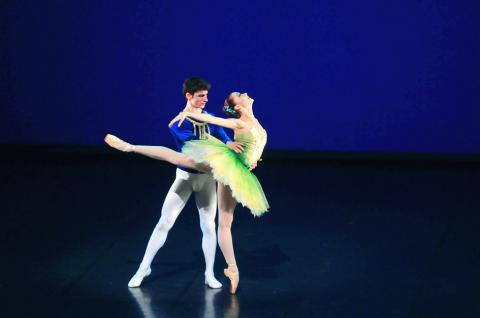Chamber Ballet Taipei’s (台北室內芭蕾舞團) founder and artistic director Allen Yu (余能盛) has crafted a nice little work in Romance — The Music and The Destiny of Tchaikovsky (羅曼史~柴可夫斯基的音樂與人生), which was performed to packed audiences at Metropolitan Hall over the weekend.
On Saturday night the young company, accompanied by the Taipei Symphony Orchestra (台北市立交響樂團), looked in fine form, with several of the dancers having notably improved over the past year. The two Romanian guest soloists, Christina Alexandra Dijmaru and Bordan Stefan Canila, were a perfect fit for the company; although technically more advanced than the other dancers they weren’t so flashy that they stole every scene.
The first section, set to Tchaikovsky’s Serenade for Strings in C, Op.48 focused on Tchaikovsky’s platonic relationship with his patroness for 13 years, Nadezhda von Meck, whose passion was expressed only through letters.

Photo: chamber ballet taipei
In the second half of this section, two birdcages appear — one with a nude man in it, the second a nude woman — setting off a tortured duet that suggests the physical passion that the pair could never express in real life. Meanwhile, Dijmaru and Canila, as the spiritual side to Tchaikovsky’s relationship with von Meck, have a nice little pas de deux and they were just beautiful to watch.
This half of the show featured Canila as a tortured Tchaikovsky, torn between his music and the relationships with the major players in his life — his mother, von Meck, his nephew and his classmate — with each figure enclosed by a large picture frame.
The one distraction in the second half of the program, set to Tchaikovsky’s Violin Concerto in D Major,Op.35 was guest violinist Tseng Yu-chien (曾宇謙). From where I was seated, I had a clear view of the 18-year-old’s violin and sometimes found myself more mesmerized by his fingering than with what was going on over his head. He got a rousing, and well-deserved, round of applause at curtain call time.

Photo courtesy of lorenzo emanuele pierucci
Overall I though the first half of the show worked better than the second in conveying the storyline, though the dancing, especially the group pieces in both were varied and interested. I just found the anguish of the tortured artist a bit too much toward the end.
Someone who did not get a special round of applause on stage, but should have, was costume designer Keith Lin (林秉豪), who has designed for the company several times before. He created quasi-19th century dresses for the women in the Serenade section as well as some great-looking unitards printed with musical notations, while for the Concerto section he had classic tutus (a first for the company).
The production will now move to Tainan for two performances next weekend at Tainan Municipal Cultural Center Performance Hall.
It is too bad we have to wait until next summer to see more of Yu and the Chamber Ballet, but I’m already looking forward to next year’s production.
Meanwhile, across town Los Angeles-based hip hop quartet Far East Movement, who are perhaps best known for their single Like A G6, made their second appearance in as many years at Luxy on Friday. An enthusiastic crowd filled the main room of the club and responded well to the group’s high-energy, on-stage theatrics.
The group told the Taipei Times before the show that they had been looking forward to partying again in Taipei — and party they did.
“Our impression of Taipei is that you guys are crazy party animals,” said Kevin Nishimura, who goes by Kev Nish. “They told us we were going on at one, and we said that was too late. We’re used to going on at 10, but then we realized that you guys just party late, so it was all love.”
Guerilla marketing
Despite their current electronic sound, the four high school friends started out very much like many hip hop artists have — guerilla marketing themselves on the streets of LA.
“It was a long process,” Nish said. “It was eight years of grinding in the streets of LA and online. We would meet up after school with an old computer and an old microphone and just start teaching ourselves how to produce and record music and write rhymes. Then we would put out hand-made CDs with our phone numbers and e-mail addresses on them.”
Nish said it was faith and focus that kept them going for those eight grueling years. “When you’re eating tacos and ramen, sleeping on peoples couches, and have no money to get a car, and you sacrifice your relationships, your girlfriends, your family, and you still do all that but don’t see any progression, people’s hopes can get down. But we always stayed focused.”
Then opportunity struck in the form of an internship at Interscope Records, and they were soon presented with a record deal. “To be an artist there now is a dream come true,” he said of Cherrytree Records, an imprint of record giant Interscope, which is home to 50 Cent, Dr. Dre and Eminem.
But somewhere along the line their bona fide hip-hop sound got lost. “We come from a DJ background and we were club rats,” Nish said. “Clubs are always evolving and the club sounds are always changing and that would explain the big shift.”
Still, the group insists they’re not turning their backs on hip-hop. “Really exploring old school hip hop and using that as an influence in dance music [has] been [a fun] challenge,” said Nish, whose vocals and lyrics are backed by Prohgress (James Roh) and J-Splif (Jae Choung). “We were packing records when hip-hop was big. Dance music is really big now, so for us it’s about blending the two.”
Nish said the “golden era” of party music was back when the Beastie Boys, Run DMC and LL Cool J had just made the scene. “We’re taking those gold chains, boom boxes, sub woofers and slow flows and mashing it up with dance music now and that’s kind of where you will see that old school influence but with a new school vibe.”
And that’s what Dirty Bass, the group’s fourth studio album, sounds like. It steps away from their club anthem Like A G6 and fuses together their party lifestyle in LA and the energy of people dancing at clubs.
“We like to take that energy and go into the studio right after we go to the club and start making music,” Nish said of Dirty Bass. He added, “We party hard and work harder.”

The 1990s were a turbulent time for the Chinese Nationalist Party’s (KMT) patronage factions. For a look at how they formed, check out the March 2 “Deep Dives.” In the boom years of the 1980s and 1990s the factions amassed fortunes from corruption, access to the levers of local government and prime access to property. They also moved into industries like construction and the gravel business, devastating river ecosystems while the governments they controlled looked the other way. By this period, the factions had largely carved out geographical feifdoms in the local jurisdictions the national KMT restrained them to. For example,

April 14 to April 20 In March 1947, Sising Katadrepan urged the government to drop the “high mountain people” (高山族) designation for Indigenous Taiwanese and refer to them as “Taiwan people” (台灣族). He considered the term derogatory, arguing that it made them sound like animals. The Taiwan Provincial Government agreed to stop using the term, stating that Indigenous Taiwanese suffered all sorts of discrimination and oppression under the Japanese and were forced to live in the mountains as outsiders to society. Now, under the new regime, they would be seen as equals, thus they should be henceforth

With over 100 works on display, this is Louise Bourgeois’ first solo show in Taiwan. Visitors are invited to traverse her world of love and hate, vengeance and acceptance, trauma and reconciliation. Dominating the entrance, the nine-foot-tall Crouching Spider (2003) greets visitors. The creature looms behind the glass facade, symbolic protector and gatekeeper to the intimate journey ahead. Bourgeois, best known for her giant spider sculptures, is one of the most influential artist of the twentieth century. Blending vulnerability and defiance through themes of sexuality, trauma and identity, her work reshaped the landscape of contemporary art with fearless honesty. “People are influenced by

The remains of this Japanese-era trail designed to protect the camphor industry make for a scenic day-hike, a fascinating overnight hike or a challenging multi-day adventure Maolin District (茂林) in Kaohsiung is well known for beautiful roadside scenery, waterfalls, the annual butterfly migration and indigenous culture. A lesser known but worthwhile destination here lies along the very top of the valley: the Liugui Security Path (六龜警備道). This relic of the Japanese era once isolated the Maolin valley from the outside world but now serves to draw tourists in. The path originally ran for about 50km, but not all of this trail is still easily walkable. The nicest section for a simple day hike is the heavily trafficked southern section above Maolin and Wanshan (萬山) villages. Remains of